小学英语语法总结及练习
五年级英语语法要点总结归纳练习题50题

五年级英语语法要点总结归纳练习题50题1.There are many ______ in the classroom.A.studentB.studentsC.student'sD.students'答案解析:B。
A 选项student 是单数形式,题干中many 表示许多,后面要用复数形式students;C 选项student's 是“学生的”,不符合题意;D 选项students' 是复数的所有格形式,也不符合题意。
2.This is my ______ book.A.fatherB.father'sC.fathersD.fathers'答案解析:B。
A 选项father 是“父亲”的意思,题干意思是“这是我父亲的书”,要用所有格形式father's;C 选项fathers 是复数形式,题干不是这个意思;D 选项fathers' 是复数的所有格形式,也不符合题意。
3.The ______ are playing on the playground.A.childB.childsC.childrenD.childrens答案解析:C。
A 选项child 是单数形式,题干中are 表明主语是复数,所以要用children;B 选项childs 拼写错误;D 选项childrens 拼写错误,正确的复数所有格是children's。
4.My sister has two ______.A.toyB.toysC.toy'sD.toys'答案解析:B。
A 选项toy 是单数形式,题干中two 表明要用复数toys;C 选项toy's 是“玩具的”,不符合题意;D 选项toys' 是复数的所有格形式,也不符合题意。
5.These are the ______ desks.A.studentB.studentsC.student'sD.students'答案解析:D。
小学英语语法汇总,含练习题及答案2020.10

小学英语语法汇总,含练习题及答案分类:一、名词(可数名词and 不可数名词)二、人称代词三、冠词四、动词五、介词六、数词七、形容词和副词八、There be 结构九、句式1.肯定句2.否定句3.疑问句4.祈使句十、时态1.一般现在是2.一般过去时3.现在进行时4.一般将来时十一、“wh”的特殊疑问句一、 名词(表示任何事物的名称)专有名词:1.特定的人、地方、机构等专有名称。
第一个字母通常要大写。
(e.g. Toby 、Shanghai,Bank of China.)2.星期、月份、节日、学科、报刊名称也属于专有名词。
普通名词:1.个体名词----表示某类人或东西中的个体。
如(student 、 desk )2.集体名词----表示若干个体组成的结合体。
如(class 、 family )3.物质名词----表示无法分为个体的物质名词。
如(water 、 rice 、 sand 、 hair )4.抽象名词----表示情感、状态、品质等抽象名词。
如(love 、carelessness )个体名词和集体名词多数可以 用数目来计算,称为可数名词,有单数、复数形式 物质名词和抽象名词通常无法用数目计算,称为不可数名词,一般只有一种形式。
1.由元音字母的变化构成:man-men/ tooth-teeth/ foot-feet/ mouse-mice/ woman-women2.单复数形式一样的名词:sheep / deer / fish (也可以fishes)3.有些名词变成复数时加-en: child-children /ox-oxenPractices:1.peach2.zoo3. glass4.foxdy6. Policewoman7. house8.photo 9. monkey 10. wife11.rose 12. path 13. judge 14.map二、人称代词主格一般用在句子前面,宾格用在动词后面,I am Li Le. Call me le le.形容词性人称代词指“某人的什么”,my book(我的书),your puppy.(你的小狗)名词性人称代词指什么是“某人的”,This book is mime(这本书是我的)Practices:1.He (他)is my brother .2.I had a letter from her(她).3.It’s all right; it’s only me(我)4.Today we (我们)went in our(我们的)car;tomorrow we(我们) are going in theirs(他们的)5.I(我)lend my(我的)books gladly to my(我的)friends and to yours(你的).6.Can you help me (我)with my (我的)English?7.When you(你)go to see your(你的)father, please take these books to him(他)。
小学英语六年级总复习语法及练习题一

小学英语语法及练习题一、名词复数规则1.一般情况下,直接加-s,如:book-books, bag-bags, cat-cats, bed-beds 2.以s. x. sh. ch结尾,加-es,如:bus-buses, box-boxes, brush-brushes, watch-watches3.以“辅音字母+y”结尾,变y为i, 再加-es,如:family-families, strawberry-strawberries4.以“f或fe”结尾,变f或fe为v, 再加-es,如:knife-knives5.不规则名词复数:man-men, woman-women, policeman-policemen, policewoman-policewomen, mouse-micechild-childrenfoot-feet,.tooth-teethfish-fish, people-people, Chinese-Chinese, Japanese-Japanese写出下列各词的复数I _________him _________this ___________her ______watch _______child _______photo ________diary ______day________ foot________ book_______ dress ________tooth_______ sheep ______box_______ strawberry _____thief _______yo-yo ______ peach______ sandwich ______man______ woman_______ paper_______ juice___________water________ milk________ rice__________ tea__________二、一般现在时一般现在时基本用法介绍No. 1一般现在时的功能1.表示事物或人物的特征、状态;如:The sky is blue.天空是蓝色的;2.表示经常性或习惯性的动作;如:I get up at six every day.我每天六点起床;3.表示客观现实;如:The earth goes around the sun.地球绕着太阳转;一般现在时的构成1. be动词:主语+beam,is,are+其它;如:I am a boy.我是一个男孩;2.行为动词:主语+行为动词+其它;如:We study English.我们学习英语;当主语为第三人称单数he, she,it时,要在动词后加"-s"或"-es";如:Mary likes Chinese.玛丽喜欢汉语;一般现在时的变化1. be动词的变化;否定句:主语+ be + not +其它;如:He is not a worker.他不是工人;一般疑问句:Be +主语+其它;如:-Are you a student-Yes. I am. / No, I'm not.特殊疑问句:疑问词+一般疑问句;如:Where is my bike2.行为动词的变化;否定句:主语+ don't doesn't +动词原形+其它;如:I don't like bread.当主语为第三人称单数时,要用doesn't构成否定句;如:He doesn't often play.一般疑问句:Do Does +主语+动词原形+其它;如:- Do you often play football- Yes, I do. / No, I don't.当主语为第三人称单数时,要用does构成一般疑问句;如:- Does she go to work by bike- Yes, she does. / No, she doesn't.特殊疑问句:疑问词+一般疑问句;如:How does your father go to work 动词+s的变化规则1.一般情况下,直接加-s,如:cook-cooks, milk-milks2.以s. x. sh. ch. o结尾,加-es,如:guess-guesses, wash-washes,watch-watches, go-goes3.以“辅音字母+y”结尾,变y为i, 再加-es,如:study-studies一般现在时用法专练:一、写出下列动词的第三人称单数drink ________ go _______ stay ________ make ________look _________ have_______ pass_______ carry ____ come________ watch______ plant_______ fly ________ study_______ brush________ do_________ teach_______二、用括号内动词的适当形式填空;1. He often ________have dinner at home.2. Daniel and Tommy _______be in Class One.3. We _______not watch TV on Monday.4. Nick _______not go to the zoo on Sunday.5. ______ they ________like the World Cup6. What _______they often _______do on Saturdays7. _______ your parents _______read newspapers every day8. The girl _______teach us English on Sundays.9. She and I ________take a walk together every evening.10. There ________be some water in the bottle.11. Mike _______like cooking.12. They _______have the same hobby.13. My aunt _______look after her baby carefully.14. You always _______do your homework well.15. I _______be ill. I’m staying in bed.16. She _______go to school from Monday to Friday.17. Liu Tao _______do not like PE.18. The child often _______watch TV in the evening.19. Su Hai and Su Yang _______have eight lessons this term.20. -What day _______be it today-It’s Saturday.三、按照要求改写句子1. Daniel watches TV every evening.改为否定句___________________________________________________2. I do my homework every day.改为一般疑问句,作否定回答________________________________________________________ 3. She likes milk.改为一般疑问句,作肯定回答___________________________4. Amy likes playing computer games.改为一般疑问句,作否定回答___________________________________________________5. We go to school every morning.改为否定句_______________________________________________________ 6. He speaks English very well.改为否定句___________________________________________________7. I like taking photos in the park.对划线部分提问________________________________________________________ 8. John comes from Canada.对划线部分提问___________________________________________________9. She is always a good student.改为一般疑问句,作否定回答________________________________________________________ 10. Simon and Daniel like going skating.改为否定句___________________________________________________五、改错划出错误的地方,将正确的写在横线上1. Is your brother speak English __________________2. Does he likes going fishing __________________3. He likes play games after class. __________________4. Mr. Wu teachs us English. __________________5. She don’t do her homework on Sundays. _________________三、现在进行时1.现在进行时表示现在正在进行或发生的动作,也可表示当前一段时间内的活动或现阶段正在进行的动作;2.现在进行时的肯定句基本结构为be+动词ing.3.现在进行时的否定句在be后加not;4.现在进行时的一般疑问句把be动词调到句首;5.现在进行时的特殊疑问的基本结构为:疑问词不达意+ be + 主语+ 动词ing但疑问词当主语时其结构为:疑问词不达意+ be + 动词ing动词加ing的变化规则1.一般情况下,直接加ing,如:cook-cooking2.以不发音的e结尾,去e加ing,如:make-making, taste-tasting3.如果末尾是一个元音字母和一个辅音字母,双写末尾的辅音字母,再加ing,如:run-running, stop-stopping现在进行时专项练习:一、写出下列动词的现在分词:play________ run__________ swim _________make__________go_________ like________ write________ _ski___________read________ have_________ sing ________ dance_________put_________ see________ buy _________ love____________live_______ take_________ come ________ get_________stop_________ sit ________ begin________ shop___________二、用所给的动词的正确形式填空:1.The boy __________________ drawa picture now.2. Listen .Some girls _______________ singin the classroom .3. My mother _________________ cook some nice food now.4. What _____ you ______ do now5. Look . They _______________ have an English lesson .6.They ____________not ,water the flowers now.7.Look the girls ________________dance in the classroom .8.What is our granddaughter doing She _________listen to music.9. It’s 5 o’clock now. We _____________havesupper now10.______Helen____________wash clothes Yes ,she is .三、句型转换:1. They are doing housework .分别改成一般疑问句和否定句__________________________________________________________________________________________________________________________ 2.The students are cleaning the classroom . 改一般疑问句并作肯定和否定回答________________________________________________________________ _________________________________________________________________ _3.I’m playing the football in the playground .对划线部分进行提问________________________________________________________________ _4.Tom is reading books in his study . 对划线部分进行提问四、将来时理论及练习一、概念:表示将要发生的动作或存在的状态及打算、计划或准备做某事;句中一般有以下时间状语:tomorrow, next dayweek, month, year…,soon, the day after tomorrow后天等;二、基本结构:①be going to + do;②will+ do.三、否定句:在be动词am, is, arel后加not或情态动词will后加not成won’t;例如:I’m going to have a picnic this afternoon.→ I’m not going to have a picnic this afternoon.四、一般疑问句:be或will提到句首,some改为any, and改为or,第一二人称互换;例如:We are going to go on an outing this weekend. → Are you going to go on an outing this weekend五、对划线部分提问;一般情况,一般将来时的对划线部分有三种情况;1. 问人;Who 例如:I’m going to New York soon. →Who’s going to New York soon.2. 问干什么;What … do.例如:My father is going to watch a race with me thisafternoon. →What is your father going to do with you this afternoon.3. 问什么时候;When.例如:She’s going to go to bed at nine. →When is she goingto bed六、同义句:be going to = willI am going to go swimming tomorrow明天. = I will go swimming tomorrow. 练习:填空;1. 我打算明天和朋友去野炊;I_____ _______ _________ have a picnic with my friends.I ________ have a picnic with my friends.2. 下个星期一你打算去干嘛我想去打篮球;What ________ ________ _________ _________ _________ next Monday I _______ ______ _____ play basketball.What _________ you do next Monday I ________ play basketball.3. 你妈妈这个周末去购物吗是,她要去买一些水果;_____ your mother _______ ________ go shopping this ___________Yes, she _________. She ______ ________ __________ buy some fruit.4. 你们打算什么时候见面;What time _______ you _________ __________ meet改句子;5. Nancy is going to go camping.改否定Nancy ________ going to go camping.6. I’ll go and join them.改否定I _______ go ______ join them.7. I’m going to get up at 6:30 tomorrow.改一般疑问句________ _______ ________ to get up at 6:30 tomorrow8. We will meet at the bus stop at 10:30.改一般疑问句_______ ________ meet at the bus stop at 10:30.9. She is going to listen to music after school.对划线部分提问________ _______ she ________ ________ _________ after school10. My father and mother are going to see a play the day after tomorrow.同上_________ _________ going to see a play the day after tomorrow.用所给词的适当形式填空;11. Today is a sunny day. We ___________________ have a picnic this afternoon.12. My brother _______________ go to Shanghai next week.13. Tom often ______________go to school on foot. But today is rain. He ______________ go to school by bike.14. What do you usually do at weekends I usually __________ watch TV and ____________catch insects15. It’s Friday today. What _____she _________ do this weekend She ______________ watch TV and _____________ catch insects.16. What ___________ d0 you do last Sunday I ____________ pick apples on a farm. What ______________ do next Sunday I ______________ milk cows.17. Mary ____________ visit her grandparents tomorrow.18. Liu Tao ____________ fly kites in the playground yesterday.19. David ______________ give a puppet show next Monday.20. I ________________ plan for my study now五、一般过去时1.一般过去时表示过去某个时间发生的动作或存在的状态,常和表示过去的时间状语连用;一般过去时也表示过去经常或反复发生的动作感谢; 2.Be动词在一般过去时中的变化:⑴am 和is在一般过去时中变为was;was not=wasn’t⑵are在一般过去时中变为were;were not=weren’t⑶带有was或were的句子,其否定、疑问的变化和is, am, are一样,即否定句在was或were后加not,一般疑问句把was或were调到句首;3.句中没有be动词的一般过去时的句子否定句:didn’t +动词原形,如:Jim didn’t go home yesterday.一般疑问句:在句首加did,句子中的动词过去式变回原形;如:Did Jim go home yesterday特殊疑问句:⑴疑问词+did+主语+动词原形如:What did Jim do yesterday⑵疑问词当主语时:疑问词+动词过去式如:Who went to home yesterday动词过去式变化规则:1.一般在动词末尾加-ed,如:pull-pulled, cook-cooked2.结尾是e加d,如:taste-tasted3.末尾只有一个元音字母和一个辅音字母的重读闭音节,应双写末尾的辅音字母,再加-ed,如:stop-stopped4.以“辅音字母+y”结尾的,变y为i, 再加-ed,如:study-studied5.不规则动词过去式:am,is-was, are-were, do-did, see-saw, say-said, give-gave, get-got, go-went, come-came, have-had, eat-ate, take-took, run-ran, sing-sang, put-put,make-made, read-read, write-wrote, draw-drew, drink-drank, fly-flew, ride-rode, speak-spoke, sweep-swept, swim-swam, sit-sat过去时练习写出下列动词的过去式isam_________ fly_______ plant________ are ________drink_________ play_______ go________ make ________does_________ dance________ worry________ ask _____taste_________ eat__________ draw________ put ______throw________ kick_________ pass_______ do ________Be动词的过去时练习1Name ____________ No. ______ Date __________一、用be动词的适当形式填空1. I _______ at school just now.2. He ________ at the camp last week.3. We ________ students two years ago.4. They ________ on the farm a moment ago.5. Yang Ling ________ eleven years old last year.6. There ________ an apple on the plate yesterday.7. There ________ some milk in the fridge on Sunday.8. The mobile phone _______ on the sofa yesterday evening.二、句型转换1. It was exciting.否定句:________________________________________________ 一般疑问句:____________________________________________ 肯、否定回答:__________________________________________ 2. All the students were very excited.否定句:________________________________________________一般疑问句:____________________________________________ 肯、否定回答:__________________________________________ 3. They were in his pocket.否定句:________________________________________________ 一般疑问句:____________________________________________ 肯、否定回答:__________________________________________ Be动词的过去时练习2Name ____________ No. ______ Date __________一、用be动词的适当形式填空1. I ______ an English teacher now.2. She _______ happy yesterday.3. They _______ glad to see each other last month.4. Helen and Nancy ________ good friends.5. The little dog _____ two years old this year.6. Look, there ________ lots of grapes here.7. There ________ a sign on the chair on Monday..8. Today _____ the second of June. Yesterday ______ the first of June. It _____ Children’s Day. All the students ______ very excited.二、句型转换1. There was a car in front of the house just now.否定句:________________________________________________一般疑问句:____________________________________________肯、否定回答:__________________________________________肯、否定回答:__________________________________________三、中译英1.我的故事书刚才还在手表旁边;___________________________________________________________ 2.他们的外套上个礼拜放在卧室里了;___________________________________________________________ 3.一会以前花园里有两只小鸟;行为动词的过去时练习1Name ____________ No. ______ Date __________一、用行为动词的适当形式填空1. He _________ live in Wuxi two years ago.2. The cat ________ eat a bird last night.3. We _______ have a party last Halloween.4. Nancy ________ pick up oranges on the farm last week.5. I ________ make a model ship with Mike yesterday.6. They ________ play chess in the classroom last PE lesson.7. My mother _______ cook a nice food last Spring Festival.8. The girls ________ sing and _______ dance at the party.二、句型转换1. Su Hai took some photos at the Sports day.否定句:________________________________________________ 一般疑问句:____________________________________________ 肯、否定回答:__________________________________________2. Nancy went to school early.否定句:________________________________________________ 一般疑问句:____________________________________________ 肯、否定回答:__________________________________________ 3. We sang some English songs.否定句:________________________________________________ 一般疑问句:____________________________________________ 肯、否定回答:__________________________________________ 行为动词的过去时练习2Name ____________ No. ______ Date __________一、用be动词的适当形式填空1. I ______ watch a cartoon on Saturday.2. Her father _______ read a newspaper last night.3. We _________ to zoo yesterday, we _____ to the park. go4. ______ you _______ visit your relatives last Spring Festival5. ______ he _______ fly a kite on Sunday Yes, he ______.6. Gao Shan _______ pull up carrots last National Day holiday.7. I ____________ sweep the floor yesterday, but my mother ______.8. What ______ she _______ find in the garden last morning She __________ find a beautiful butterfly.二、句型转换1. They played football in the playground.否定句:________________________________________________一般疑问句:____________________________________________肯、否定回答:__________________________________________三、中译英1. 格林先生去年住在中国;________________________________________________________2. 昨天我们参观了农场;________________________________________________________3. 他刚才在找他的手机;________________________________________________________ 过去时综合练习1Name ____________ No. ______ Date __________一、用动词的适当形式填空1. It ______ be Ben’s birthday last Friday.2. We all ______ have a good time last night.3. He ________ jump high on last Sports Day.4. Helen ________ milk a cow on Friday.5. She likes ______ newspapers, but she ______ a book yesterday. read6. He _______ football now, but they _______ basketball just now. play7. Jim’s mother _________ plant trees just now.8. _______ they ________ sweep the floor on Sunday No, they _____.9. I _______ watch a cartoon on Monday.10. We ___________ go to school on Sunday.。
小学英语语法大全完美版(含练习)

目录概述 (1)第一讲句子 (2)第二讲名词 (4)第三讲冠词 (7)第四讲代词 (9)第五讲形容词和数词 (11)第六讲副词 (14)第七讲介词 (15)第八讲连词 (17)第九讲动词 (18)第十讲语法的根本概念 (20)第十一讲一般现在时 (22)第十二讲现在进行时 (24)第十三讲一般过去时 (26)第十四讲一般将来时 (28)第十五讲句法 (30)第十六讲话题 (32)概述英语语法是什么:英语语法是针对英语语言进行研究后,英语语法系统地总结归纳出来的一系列语言规那么。
英语语法的精髓在于掌握语言的使用。
英语语法是分类的,分为词法和句法。
小学英语语法和初高中相比拟,只是在语法数量和难易程度上有差异。
英语有些方面是有一些规律可循的,但是英语还有它另外一个显著的特点,那就是知识点的零碎、分散。
万丈高楼从地起,想要学好英语,那就需要注重英语根底。
根底打牢才会越学越轻松。
对于小学语法的讲解,将会从词法、句法、时态三个方面展开:【词法】八大词法:名词形容词副词代词动词数词介词冠词【句法】七种句型:陈诉句、疑问句〔一般疑问句、选择疑问句、特殊疑问句〕祈使句、被动句、There be句型、if条件句、感慨句【时态】四种时态:一般现在时、现在进行时、一般过去时、一般将来时第一讲:句子第二讲:名词名词的定义:名词是指表示人和事物名称的词,可以分为专有名词和普通名词两大类。
一:名词的种类:专有名词普通名词国名地名人名,团体机构名称可数名词不可数名词个体名词集体名词抽象名词物质名词1e.g. Jim Green,New York,Bank of China,Peking University星期、月份、节日、学科、报刊名也是专有名词。
e.g. Monday,May,Christmas,Spring Festival,Maths,China Daily2、普通名词:表示一类人或物或抽象概念的名称。
普通名词又可以分为四类:个体名词——表示某类人或东西中的个体,如:student , desk集体名词——表示假设干个体组成的集合体,如:class , family物质名词——表示无法分为个体的物质名称,如:water , rice , sand,hair抽象名词——表示情感,状态,品质等抽象名称,如:love ,carelessness个体名词和集体名词多数可以用数目来计算,称为可数名词,有单、复数形式;物质名词和抽象名词通常无法用数目计算,称为不可数名词,一般只有一种形式。
(完整版)小学英语语法及练习题

★第一课人称代词主格 (做主语 )宾格 (动、介后 )形容格(跟名词名词格一般放句首句尾的放名词前的句尾独自用I me my mine youyouyouryour ( 你,你们 )he him his his she her her hers it it its its weus our Ours theythemtheirtheirs1. Are these ( you )pencils? Yes,they are (our ).2. This isn`t my book. _______(我的 ) is in the bag.3.Could_________(你)ask_________(他) to call_________(我)back?4.Don ’ t forget (我们) ?5._________(我们 )would like to buy_________ (它们 ).6. ---Who is it in this picture? --- It ’ s 我)(.7. There ’ s one dollar on the floor. Pick它)u(p.(他们) are friendly to___________(你们) .(他) give_______(它 )to__________(她)?(他) does__________他(的 )homework on Sunday.1. Hello, may ___________ (我) speak to Jack?2. My bag is small. Can I use ____________ 你(的 )?3. That is___________他(们的 ) new house.2. -Whose is this pencil?-It's ________(I ).4. My ruler is long. ____________ ( 她的 ) is short.5. __________(他的 ) teacher is good. ___________她(的 )is good, too. 3. I love ________(they )very much.6. Mr. Green often tells ___________我(们 ) some stories. 4. She is________( I )classmate. (他) often helps ________(我们) with our lessons.5.Miss Li often looks after________(she )brother.6 -Are these ________(they ) bags ?8.Shall ________(我们) go and join ________(她们) ? 9. ________(我) want to go with ________(他们).-No, they aren't ________(their ) . They are ________(we ) .7. That is not _________ kite.10. Could(你)tell (我)how to get to the nearest hotel? 1. Let ________(我) help ________(你们). That kite is very small, but _________ is very big.( I )It's time for ________(她) to go home.8.2. The dress is _________. Give it to _________. ( she )9. Is this _________ watch? (you) No, it’ s not _________ . ( I )3.It's very nice of ________(你).1. This bike is my sister`s. It belongs to ______ 她( 4. This bike is my sister`s. It belongs to ______ 她(的 )。
小学英语语法练习题及答案

小学英语语法练习题及答案一、名词练习1. 单复数名词- 单数名词变复数名词:- Book → Books- Child → Children- Foot → Feet2. 名词所有格- 表示所有关系的名词:- The cat's tail (猫的尾巴)- My father's car (我爸爸的车)答案:1.- Books- Children- Feet2.- The cat has a long tail.- His car is new.二、动词练习1. 动词的时态- 现在进行时:- She is reading a book.- 一般过去时:- They walked to school.2. 动词的第三人称单数- He plays football every day.答案:1.- She is reading a book now.- Yesterday, they walked to school. 2.- He plays football every day.三、形容词和副词练习1. 形容词比较级和最高级- 比较级:Bigger, faster- 最高级:The biggest, the fastest2. 副词的使用- 副词修饰动词:- She runs quickly.答案:1.- The cat is bigger than the dog.- This is the fastest car in the race.2.- She runs quickly to catch the bus.四、代词练习1. 人称代词- 主格代词:I, you, he, she, it- 宾格代词:me, you, him, her, it2. 物主代词- 形容词性物主代词:my, your, his, her, its - 名词性物主代词:mine, yours, his, hers, its答案:1.- I am going to the park. (主格)- Can you pass the ball to me? (宾格)2.- This is my book. (形容词性)- The book is mine. (名词性)五、介词练习1. 表示时间的介词- In, on, at- In the morning, on Monday, at 5 o'clock2. 表示地点的介词- In, on, at, to- In the classroom, on the desk, at the zoo, to the library答案:1.- I wake up in the morning.- We have a party on my birthday.- The meeting starts at 3 PM.2.- The cat is in the box.- The book is on the table.- We go to the park.六、疑问句练习1. 一般疑问句- Do you like apples?- Does she have a sister?2. 特殊疑问句- What is your name?- Where are you going?答案:1.- Yes, I do.- No, she doesn't.2.- My name is Tom.- I am going to the cinema.。
小学英语语法总结及练习
小学英语语法总结及练习小学英语语法总结及练习一、名词复数规则1.一般情况下,直接加-s,如:b-bs, bag-bags, cat-cats, bed-beds2.以s. x. sh. ch结尾,加-es,如:bus-buses, bx-bxes, brush-brushes,2. Listen .Se girls _______________ ( sing)in the classr .3. M ther _________________ ( c )se nice fd n7.L! the girls ________________(dance )in the classr .8.What is ur granddaughter ding? She _________(listen ) t usic.9. It’s 5 ’clc n练习填空:1. 我打算明天和朋友去野炊。
I_____ _______ _________ have a picnic2. He ________ at the cap last10. She _______ happ esterda.11. The _______ glad t see each ther last nth.行为动词的过去时练习(2)1. I ______ (2. Listen .Se girls _______________ ( sing)in the classr .3. M ther _________________ ( c )se nice fd n7.L! the girls ________________(dance )in the classr .8.What is ur granddaughter ding? She _________(listen ) t usic.9. It’s 5 ’clc n练习:填空。
1. 我打算明天和朋友去野炊。
五年级英语语法总结练习题50题(带答案)
五年级英语语法总结练习题50题(带答案)1. There are some ____ in the school library.A.bookB.booksC.book'sD.books'答案解析:B。
本题考查名词复数。
根据句中的“are”可知,这里需要复数名词,选项A“book”是单数,不符合;选项C“book's”是名词所有格形式,这里不是表达所属关系,不符合题意;选项D“books'”是复数名词的所有格形式,也不符合,只有选项B“books”是“book”的复数形式,正确。
2. This is ____ bedroom.A.TomB.Tom'sC.TomsD.Toms'答案解析:B。
本题考查名词所有格。
“bedroom”是名词,前面需要表示所属关系的词,选项A“Tom”是人名,不能直接修饰“bedroom”;选项C“Toms”这种形式错误;选项D“Toms'”是复数名词的所有格,而这里是一个人的卧室,应该用单数名词所有格,选项B“Tom's”表示“Tom的”,正确。
3. How many ____ do you have?A.pencilB.pencilsC.pencil'sD.pencils'答案解析:B。
本题考查名词复数。
“How many”后面要接可数名词复数形式,选项A“pencil”是单数,不符合;选项C“pencil's”是名词所有格,这里不是表示所属关系;选项D“pencils'”是复数名词的所有格,不符合题意,选项B“pencils”是“pencil”的复数,正确。
4. The ____ of the cat is very cute.A.pictureB.picturesC.picture'sD.pictures'答案解析:A。
本题考查名词单复数。
句中的“is”表明主语是单数形式,选项B“pictures”是复数,不符合;选项C“picture's”是名词所有格,这里不是表达所属关系;选项D“pictures'”是复数名词的所有格,不符合题意,选项A“picture”是单数,正确。
小学英语语法总结及习题——现在进行时与一般现在时
千里之行,始于足下。
小学英语语法总结及习题——现在进行时与一般现在时现在进行时和一般现在时是英语中最常用的两种时态。
以下是它们的总结及习题:现在进行时:现在进行时表示目前正在进行的动作或状态。
它的构成是be动词(am, is, are)+动词-ing形式。
常用于描述当前正在发生的事情,强调动作的进行。
肯定句的形式:主语+am/is/are+动词-ing形式否定句的形式:主语+am/is/are+not+动词-ing形式疑问句的形式:Am/Is/Are+主语+动词-ing形式?例句:1. I am studying English now.(我正在学英语。
)2. He is playing football with his friends.(他正在和朋友们踢足球。
)3. We are not watching TV at the moment.(我们现在不看电视。
)4. Are they eating lunch now?(他们现在在吃午饭吗?)现在进行时的用法:1. 表示现在正在进行的事情:I am doing my homework.(我正在做作业。
)2. 表示计划或安排的事情:She is meeting her friends tonight.(她今晚打算和她的朋友会面。
)3. 表示不断重复的事情:They are always arguing.(他们总是在争吵。
)第1页/共3页锲而不舍,金石可镂。
4. 表示暂时的状态:He is staying in Beijing for a week.(他在北京呆一周。
)现在进行时练习:1. Jason ___________ (watch) TV at the moment.2. They ___________ (play) basketball in the park now.3. We ___________ (not study) French at school.4. ________ Peter ___________ (do) his homework now?5. What ___________ you ___________ (do) this weekend?6. The baby ___________ (cry) because he is hungry.一般现在时:一般现在时表示习惯性、经常性或普遍的动作或状态。
小学英语语法归纳总结(时态综合练习)
小学英语语法归纳总结及综合练习一、名词1、写出下列各词的复数。
I _________ him _________ this _______ her ______ watch _______ tomato_______child _______ photo ________ diary ______ day________ foot________ dress ________ tooth_______sheep ______ box_______ strawberry _____ thief _______ engineer______ peach______sandwich ______ man______ woman_______ leaf_______ people________2、用所给名词的正确形式填空。
(1)Are there two ( box ) on the table?(2)I can see some ( people ) in the cinema.(3)How many ( day ) are there in a week?(4)Here’re five( bottle ) of ( juice ) for you.(5)This ( violin ) is hers. Those ( grape ) are over there.二、冠词1、用a或an填空。
____ “U” ____ ice-cream ____ goalkeeper ____ teapot ____apple____office ____English book ____umbrella ____unit ____hour2、根据需要,填写冠词a,an或the。
(1)Who is ____girl behind ____tree?(2) ____old man has two children, ____ son and ____daughter.(3)This is ____ orange. ____ orange is Lucy’s.(4)He likes playing ____guitar. We have ____same hobby.(5)We all had____good time last Sunday.(6)She wants to be____doctor.三,数词1、请翻译下列短语。
- 1、下载文档前请自行甄别文档内容的完整性,平台不提供额外的编辑、内容补充、找答案等附加服务。
- 2、"仅部分预览"的文档,不可在线预览部分如存在完整性等问题,可反馈申请退款(可完整预览的文档不适用该条件!)。
- 3、如文档侵犯您的权益,请联系客服反馈,我们会尽快为您处理(人工客服工作时间:9:00-18:30)。
小学英语语法总结及练习一、名词复数规则1.一般情况下,直接加-s,如:book-books, bag-bags, cat-cats, bed-beds2.以s. x. sh. ch结尾,加-es,如:bus-buses, box-boxes, brush-brushes, watch-watches 3.以“辅音字母 y”结尾,变y为i, 再加-es,如:family-families, strawberry-strawberries 4.以“f或fe”结尾,变f或fe为v, 再加-es,如:knife-knives,leaf——leaves5.不规则名词复数:man-men, woman-women, policeman-policemen, policewoman-policewomen,child-children, foot-feet, tooth-teethfish-fish, deer-deer, sheep-sheep, people-people, Chinese-Chinese, Japanese-Japanese写出下列各词的复数I _________ him _________ this ___________ her ______watch _______ child _______ photo ________ diary ______day________ foot________ book_______ dress ________tooth_______ sheep ______ box_______ strawberry _____peach______ sandwich ______ dish_______ bus_______man______ woman_______二、一般现在时一般现在时基本用法介绍:【No. 1】一般现在时的功能1.表示事物或人物的特征、状态。
如:The sky is blue.天空是蓝色的。
2.表示经常性或习惯性的动作。
如:I get up at six every day.我天天六点起床。
3.表示客观现实。
如:The earth goes around the sun.地球绕着太阳转。
一般现在时的构成:1. be动词:主语+be(am,is,are)+其它。
如:I am a boy.我是一个男孩。
2.行为动词:主语+行为动词( 其它)。
如:We study English.我们学习英语。
当主语为第三人称单数(he, she,it)时,要在动词后加"-s"或"-es"。
如:Mary likes Chinese.玛丽喜欢汉语。
【No. 2】一般现在时的变化1. be动词的变化。
否定句:主语+be not+其它。
如:He is not a worker.他不是工人。
一般疑问句:Be+主语+其它。
如:-Are you a student? -Yes. I am. / No, I'm not.非凡疑问句:疑问词+一般疑问句。
如:Where is my bike?2.行为动词的变化。
否定句:主语+don't( doesn't )+动词原形( 其它)。
如:I don't like bread.当主语为第三人称单数时,要用doesn't构成否定句。
如:He doesn't often play.一般疑问句:Do( Does )+主语+动词原形+其它。
如: - Do you often play football? - Yes, I do. / No, I don't.当主语为第三人称单数时,要用does构成一般疑问句。
如: - Does she go to work by bike? - Yes, she does. / No, she doesn't.1.一般情况下,直接加-s,如:cook-cooks, milk-milks2.以s. x. sh. ch. o结尾,加-es,如:guess-guesses, wash-washes, watch-watches, go-goes 3.以“辅音字母 y”结尾,变y为i, 再加-es,如:study-studies一般现在时用法专练:一、写出下列动词的第三人称单数drink ________ go _______ stay ________ make ________look _________ have_______ pass_______ carry ________come________ watch______ plant_______ fly _________study_______ brush________ do_________ teach_______wash_______二、用括号内动词的适当形式填空。
1. He often ________(have) dinner at home.2. Daniel and Tommy _______(be) in Class One.3. We _______(not watch) TV on Monday.4. Nick _______(not go) to the zoo on Sunday.5. ______ they ________(like) the World Cup?6. What _______they often _______(do) on Saturdays?7. _______ your parents _______(read) newspapers every day?8. The girl _______(teach) us English on Sundays.9. She and I ________(take) a walk together every evening.10. There ________(be) some water in the bottle.11. Mike _______(like) cooking.12. They _______(have) the same hobby.13. My aunt _______(look) after her baby carefully.14. You always _______(do) your homework well.15. I _______(be) ill. I’m staying in bed.16. She _______(go) to school from Monday to Friday.17. Liu Tao _______(do) not like PE.18. The child often _______(watch) TV in the evening.19. Su Hai and Su Yang _______(have) eight lessons this term.20. -What day _______(be) it today?- It’s Saturday三、现在进行时1.现在进行时表示现在正在进行或发生的动作,也可表示当前一段时间内的活动或现阶段正在进行的动作。
2.现在进行时的肯定句基本结构为:be+动词ing.3.现在进行时的否定句在be后加not。
4.现在进行时的一般疑问句把be动词调到句首。
5.现在进行时的特殊疑问的基本结构为:特殊疑问词+be+主语+动词ing?但疑问词当主语时其结构为:特殊疑问词+be+动词ing?1.一般情况下,直接加ing,如:cook-cooking2.以不发音的e结尾,去e加ing,如:make-making, taste-tasting3.假如末尾是一个元音字母和一个辅音字母,双写末尾的辅音字母,再加ing,如:run-running, stop-stopping现在进行时专项练习:一、写出下列动词的现在分词:play________ run__________ swim _________make__________go_________ like________ write________ _ski___________read________ have_________ sing ________ dance_________put_________ see________ buy _________ love____________live_______ take_________ come ________ get_________stop_________ sit ________ begin________ shop___________二、用所给的动词的正确形式填空:1.The boy __________________ ( draw)a picture now.2. Listen .Some girls _______________ ( sing)in the classroom .3. My mother _________________ ( cook )some nice food now.4. What _____ you ______ ( do ) now?5. Look . They _______________( have) an English lesson .6.They ____________(not ,water) the flowers now.7.Look! the girls ________________(dance )in the classroom .8.What is our granddaughter doing? She _________(listen ) to music.9. It’s 5 o’clock now. We _____________(have)supper now10.______Helen____________(wash )clothes? Yes ,she is .四、将来时理论及练习1、概念:表示将要发生的动作或存在的状态及打算、计划或预备做某事。
句中一般有以下时间状语:tomorrow, next day(week, month, year…),soon,the day after tomorrow(后天)等。
2、基本结构:①be going to do;②will do.3、否定句:在be动词(am, is, are)后加not或情态动词will后加not成won’t。
